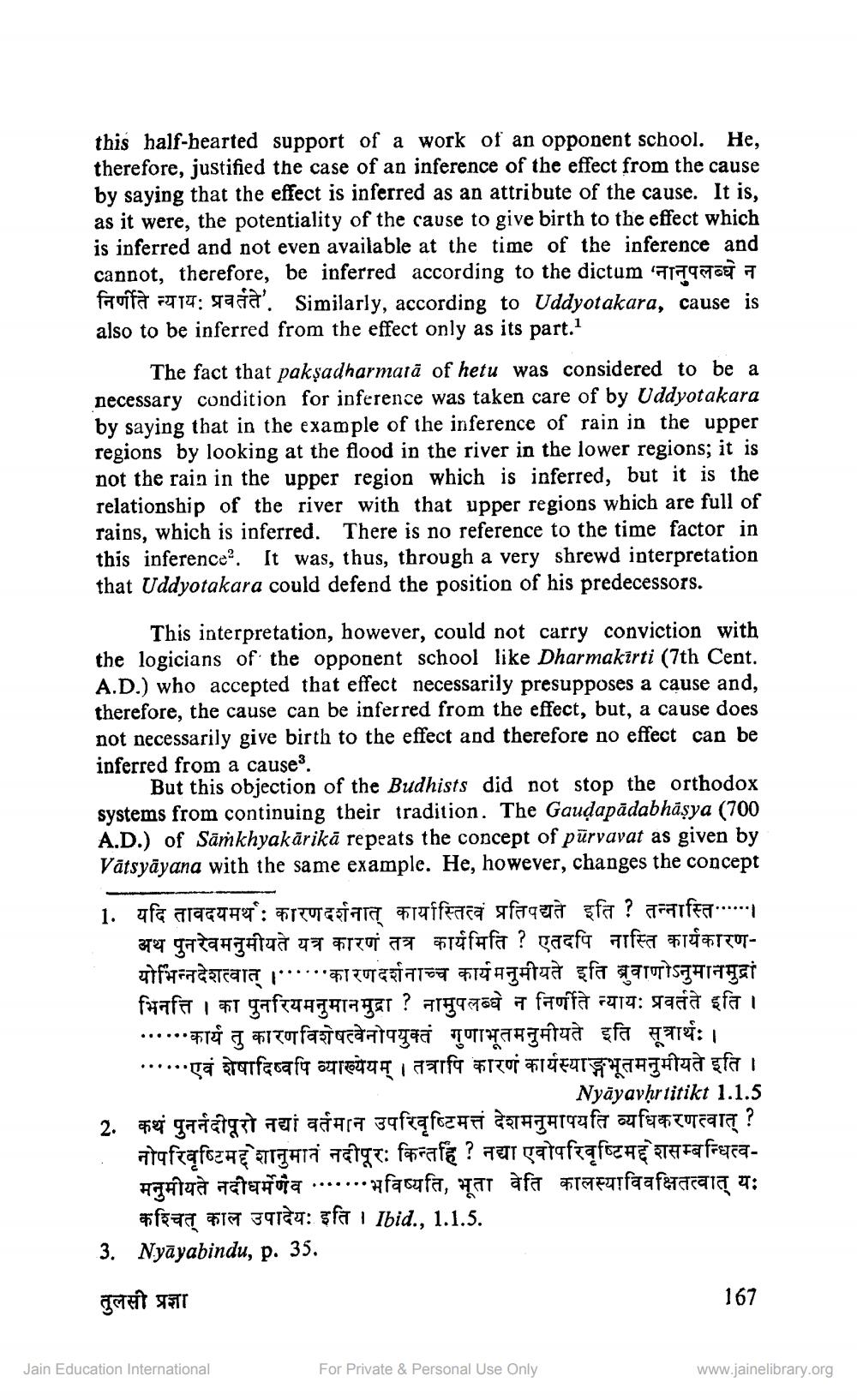________________
this half-hearted support of a work of an opponent school. He, therefore, justified the case of an inference of the effect from the cause by saying that the effect is inferred as an attribute of the cause. It is, as it were, the potentiality of the cause to give birth to the effect which is inferred and not even available at the time of the inference and cannot, therefore, be inferred according to the dictum 'नानुपलब्ध न निर्णीते न्याय: प्रवर्तते'. Similarly, according to Uddyotakara, cause is also to be inferred from the effect only as its part."
The fact that pakşadharmatā of hetu was considered to be a necessary condition for inference was taken care of by Uddyotakara by saying that in the example of the inference of rain in the upper regions by looking at the flood in the river in the lower regions; it is not the rain in the upper region which is inferred, but it is the relationship of the river with that upper regions which are full of rains, which is inferred. There is no reference to the time factor in this inferences. It was, thus, through a very shrewd interpretation that Uddyotakara could defend the position of his predecessors.
This interpretation, however, could not carry conviction with the logicians of the opponent school like Dharmakirti (7th Cent. A.D.) who accepted that effect necessarily presupposes a cause and, therefore, the cause can be inferred from the effect, but, a cause does not necessarily give birth to the effect and therefore no effect can be inferred from a cause?
But this objection of the Budhists did not stop the orthodox systems from continuing their tradition. The Gaudapādabhāşya (700 A.D.) of Sāṁkhyakārikā repeats the concept of pūrvavat as given by Vātsyāyana with the same example. He, however, changes the concept
1. यदि तावदयमर्थः कारणदर्शनात् कार्यास्तित्वं प्रतिपद्यते इति ? तन्नास्ति......।
अथ पुनरेवमनुमीयते यत्र कारणं तत्र कार्यमिति ? एतदपि नास्ति कार्यकारणयोभिन्नदेशत्वात् । ..... का रणदर्शनाच्च कार्य मनुमीयते इति ब्रुवाणोऽनुमानमुद्रां भिनत्ति । का पुनरियमनुमानमुद्रा ? नामुपलब्धे न निर्णीते न्यायः प्रवर्तते इति । ......कार्य तु कारणविशेषत्वेनोपयुक्तं गुणाभूतमनुमीयते इति सूत्रार्थः । ...... एवं शेषादिष्वपि व्याख्येयम् । तत्रापि कारणं कार्यस्याङ्गभूतमनुमीयते इति ।
Nyāyavậr titikt 1.1.5 2. कथं पुनर्नदीपूरो नद्यां वर्तमान उपरिवृष्टिमत्तं देशमनुमापयति व्यधिकरणत्वात् ?
नोपरिवृष्टिमद्देशानुमानं नदीपूरः किन्तर्हि ? नद्या एवोपरिवृष्टिमद्देशसम्बन्धित्वमनुमीयते नदीधर्मेणैव ...... भविष्यति, भूता वेति कालस्याविवक्षितत्वात् यः
कश्चित् काल उपादेयः इति । Ibid., 1.1.5. 3. Nyayabindu, p. 35.
तुलसी प्रज्ञा
167
Jain Education International
For Private & Personal Use Only
www.jainelibrary.org




